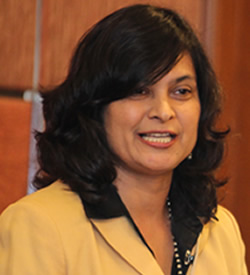

Follow these links to find out more about the Health Policy Project's related work.
- Read about HPP's activities in India
- Learn about HPP's work in Health Finance and Costing
Organization: Health Policy Project
Country: India/US
Area of Response to HIV: Finance
Interview was originally published in the January 2014 newsletter.
Interview with Suneeta Sharma
Suneeta Sharma, PhD, has over 20 years of experience teaching and implementing health policy, financing, and equity projects globally, and is the project director of the USAID- and PEPFAR-funded Health Policy Project, led by Futures Group. HIV Policy Monitor spoke to Dr. Sharma about her experience in the global health field and why policy and advocacy are important
HIV Policy Monitor: Why are policy and advocacy important in global and public health?
Policy is important because it sets priorities and gives direction. If you have the right planning, and strong, evidence-based policies in place, chances are your programs can be successful. Advocacy is a continuous process of reaching policymakers with the right message at the right time, including concrete policy solutions for the health challenges being faced in the community. We've had great successes globally in supporting policymakers and advocates in policy reform, resource allocation, and mobilizing political commitment.
HIV Policy Monitor: What is the value advocacy brings to the response to HIV?
Advocacy has been an important part of the policy projects that Futures Group has implemented over the past 35 years. In Nepal, for example, we helped mainstream HIV programs across several ministries through the ASHA Project, and helped advance the HIV/AIDS Bill in 2007 through a high-level advocacy effort with Ministries of Gender, Health, Labor, and Commerce. We strengthened the capacity of civil society organizations focused on vulnerable populations, including women and lesbian, gay, bisexual, and transgender populations, to advocate for their needs and supported the first-ever meeting of the Federation of Women Living with HIV in Nepal. Bringing together such diverse stakeholders helped enshrine a National HIV/AIDS Bill that respected the needs of all stakeholders and provided clear direction for the government's efforts in the national response to HIV.
Some of our work included drafting training manuals and supporting sensitivity trainings among diverse sectors of the government, primarily military and police forces. At the district level, Futures Group strengthened the capacity of District AIDS Coordinating Committees and local partners in implementing new HIV/AIDS policies. Futures Group also worked with the private sector, sensitizing journalists and other media personnel on issues related to HIV and AIDS. Only through reaching different sectors of society can we see a comprehensive, successful response to HIV.
HIV Policy Monitor: What is the importance of monitoring policies, laws, and strategies in the response to HIV around the world?
The Health Policy Project has an important role to play in terms of monitoring policies. It's important to have goals, and we need to be strategic in thinking in terms of how policies are directed based on evidence and how they are being implemented-what is working and what is not working-so we can help countries take corrective action. We can offer several approaches, including engaging beneficiaries in monitoring policy implementation.
In India, we have implemented a number of interventions that engaged the poor, pregnant women, community-based educators, and distributors of family planning methods. Healthcare providers and beneficiaries can play an important role in monitoring what is working and not working and act as links between the community, health centers, and local governments. The poor can and should be engaged in policy development and monitoring, and providers should be accountable for achieving health equity goals.
HIV Policy Monitor: What role do you see USAID, and other donors, playing in policy implementation in countries that receive assistance?
The role of USAID and other donors now is more focused on country ownership and sustainability. This is achieved by building organizational, institutional, and systems-level capacity, and strengthening resource centers in the country, so there are systems in place for policy development, monitoring, and implementation.
Countries' HIV programs will be more sustainable if local stakeholders identify, address, and remove barriers to policy implementation. Donors have an interest in building capacity to make sure there is an evidence-based, systematic process for examining and monitoring policy implementation to ensure countries are delivering on promises.
Dr. Sharma has written publications, journal articles, and technical briefs on health finance, equity, and health economics. Below are two examples of her work.